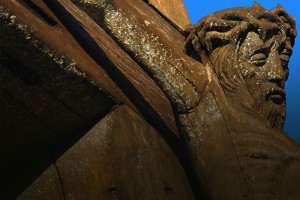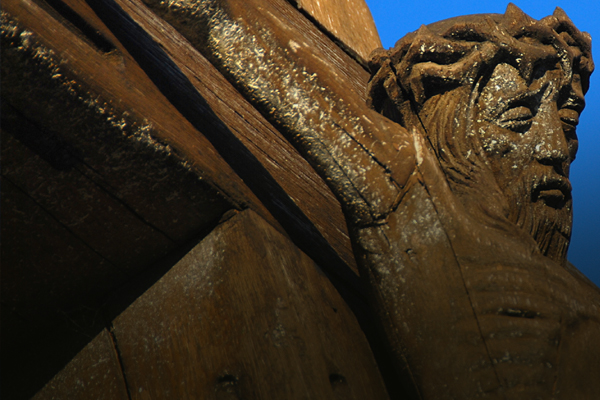
Jesus pre-crucifixion experience was unusual given His identity and claims. As we review the chronology prior to the crucifixion, we begin to understand why Jesus died so quickly on the cross:
They Struck Him in the Head
Remember that Jesus was delivered to the cross through the Jewish rulers who abused Him prior to the crucifixion. This wasn’t the case for every victim of crucifixion. Jesus’ treatment started with physical abuse from the onset. When he refused to answer the high priest in the manner they expected, Jesus was struck by an officer:
John 18:21-22
“Why do you question Me? Question those who have heard what I spoke to them; they know what I said.” When He had said this, one of the officers standing nearby struck Jesus, saying, “Is that the way You answer the high priest?”
They Beat Him With Their Fists and Slapped Him in the Face
The physical abuse of Jesus continued based on His claims of Deity. Not every prisoner made these kinds of assertions. Jesus’ claims caused His captors to treat him even more harshly, tormenting and mocking Him both verbally and physically:
Mark 14:65
Some began to spit at Him, and to blindfold Him, and to beat Him with their fists, and to say to Him, “Prophesy!” And the officers received Him with slaps in the face.
They Scourged Him
In another unusual turn of events, Pontius Pilate received Jesus from the Jewish rulers and appeared troubled about sentencing Jesus to crucifixion. In fact, Pilate found nothing worthy of crucifixion and attempted to appease the angry Jewish mob by having Jesus scourged badly:
John 18:38-40, 19:1, 4-6
[Pilate] went out again to the Jews and said to them, “I find no guilt in Him. But you have a custom that I release someone for you at the Passover; do you wish then that I release for you the King of the Jews?” So they cried out again, saying, “Not this Man, but Barabbas.” Now Barabbas was a robber. Pilate then took Jesus and scourged Him… Pilate came out again and said to them, “Behold, I am bringing Him out to you so that you may know that I find no guilt in Him.” Jesus then came out, wearing the crown of thorns and the purple robe. Pilate said to them, “Behold, the Man!” So when the chief priests and the officers saw Him, they cried out saying, “Crucify, crucify!” Pilate said to them, “Take Him yourselves and crucify Him, for I find no guilt in Him.”
Pilate scourged Jesus violently in an effort to pacify a crowd that wanted to kill Jesus. The level and depth of Jesus’ scourging was likely severe enough to appeal to the crowds desires. Mel Gibson’s Passion of the Christ likely captured the brutality of the whipping. A Roman scourge (called a “flagrum”) was typically a multi-stranded whip or lash containing bits and pieces of stone or bone in the lash tips. A beating with a Roman scourge left victims bloody and severely injured. Given Pilate’s desire to appease the Jewish crowd calling for Jesus’ death, he subjected Jesus to a brutal beating just short of a death sentence. Jesus was likely scourged to within an inch of His life.
They Beat Him in the Head With A Reed
Following the scourging, the soldiers continued to mock Jesus and torment Him physically. They pushed a crown of thorns on his head and eventually beat Him with a reed:
Matthew 27:30
And after weaving a crown of thorns, they put it on His head, and a reed in His right hand; and they kneeled down before Him and mocked Him, saying, “Hail, King of the Jews! And they spat on Him, and took the reed and began to beat Him on the head.
They Forced Him to Carry His Cross
Jesus was now injured dramatically, yet the Roman soldiers demanded He carry His cross to the site of the crucifixion in spite of his condition. He clearly was unable to accomplish the task, given what He suffered. As a result, Simon of Cyrene was pressed into service to help Jesus carry the cross:
Matthew 27:32
And as they were coming out, they found a man of Cyrene named Simon, whom they pressed into service to bear His cross.
They Crucified Him
Jesus was then crucified alongside the two criminals. His path to the cross was very different than theirs, however. His pre-crucifixion beatings were driven by factors unique to Jesus’ identity and assertions:
Matthew 27:32
And when they had crucified Him, they divided up His garments among themselves by casting lots. And sitting down, they began to keep watch over Him there. And above His head they put up the charge against Him which read, “THIS IS JESUS THE KING OF THE JEWS.”
Jesus died more quickly than other crucifixion victims because of his unique pre-crucifixion experience. As a result, his early death is reasonable and expected. Share on X
Jesus suffered a significant and unique beating prior to His crucifixion. Anyone beaten as badly as Jesus in the hours prior to his crucifixion would surely have suffered circulatory shock and heart failure in a short period of time on the cross. In fact, the evidence of John’s observations related to water pouring from Jesus’ side when stabbed by the soldier (John 19:31-34) are consistent with this form of death. Jesus died more quickly than other crucifixion victims because of his unique pre-crucifixion experience. As a result, his early death is reasonable and expected. We can be confident Jesus died on the cross and was truly resurrected rather than resuscitated.

J. Warner Wallace is a Dateline featured Cold-Case Detective, Senior Fellow at the Colson Center for Christian Worldview, Adj. Professor of Christian Apologetics at Talbot School of Theology, Biola University, author of Cold-Case Christianity, God’s Crime Scene, and Forensic Faith, and creator of the Case Makers Academy for kids.
Subscribe to J. Warner’s Daily Email
J. Warner Wallace is a Dateline featured cold-case homicide detective, popular national speaker and best-selling author. He continues to consult on cold-case investigations while serving as a Senior Fellow at the Colson Center for Christian Worldview. He is also an Adj. Professor of Christian Apologetics at Talbot School of Theology, Biola University, and a faculty member at Summit Ministries. He holds a BA in Design (from CSULB), an MA in Architecture (from UCLA), and an MA in Theological Studies (from Gateway Seminary).

































Pingback: Why Jesus Died So Quickly on the Cross | A disciple's study
Pingback: Why Jesus Died So Quickly on the Cross | Cold Case Christianity | Christian News
Pingback: Why Jesus Died So Quickly on the Cross | Cold Case Christianity | Christians Following Jesus
Pingback: Weekly Apologetics Bonus Links 3/31 – 4/6 | Apologetics315
Chuck Hickmam
June 29, 2022 at 10:11 am
Jesus being dead before the spear was stabbed into His chest with the water and blood coming out is a painful thing to think about. He surly was tortured before being put upon the cross.